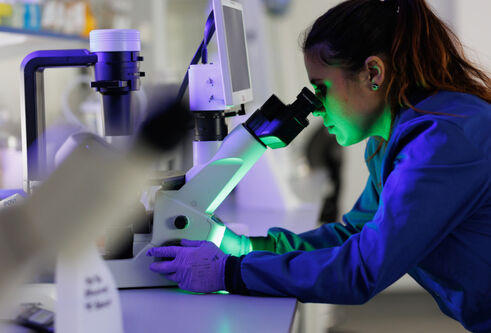
Contact
Websites
Biography
Dr Mahima Swamy is a Senior Lecturer and Programme Leader in the MRC Protein Phosphorylation and Ubiquitylation Unit (MRC PPU) at the University of Dundee. Mahima’s lab works broadly in the areas of intestinal immunology, diet, intestinal infection and autoimmune bowel diseases,. Originally from Bangalore, India, she did her PhD at the Max-Planck Institute of Immunobiology in Freiburg, Germany, and then two postdoc stints, one in CRUK’s London Research Institute with Prof. Adrian Hayday, and another at the University of Dundee with Prof. Doreen Cantrell. She started her lab in the MRC PPU in Dundee in 2017, with a Wellcome Trust Sir Henry Dale Fellowship. She was selected to join the EMBO Young Investigator network in 2022, and is now a Programme Leader in the MRC PPU.
Research
The main function of the intestinal epithelium is to absorb nutrients from food, but it also serves as a barrier to protect the body from harmful pathogens, chemicals, and food antigens, and is the site of many autoimmune inflammatory bowel diseases (IBD) such as Crohn’s disease and Coeliac disease, when there is a breakdown of tolerance. Research in my lab has two main themes: 1) the fascinating dynamics of intraepithelial T lymphocytes (IEL)and their complex communication with intestinal epithelial cells to maintain homeostasis, and 2) molecular dissection of clinically relevant kinases expressed in immune cells in IBD.
To aid in the protection of the intestinal epithelium, the epithelial layer is patrolled by an unconventional pool of T lymphocytes called intraepithelial lymphocytes (IEL). Despite being one of the largest subsets of T cells, we understand very little of how these cells are maintained in quiescence at homeostasis; are activated in the presence of external insults, how they are fuelled and how they respond. Research in my lab aims to define how IEL coordinate responses to chemical, dietary and microbial inputs at the intestinal epithelium to regulate epithelial function. Some key findings in this area are: 1) We identified key metabolic, translational, and signalling constraints that prevent spurious activation of IEL (Brenes et al, 2021), 2) We found that IEL use the cytotoxic proteases Granzyme A to defend intestinal epithelial cells against Salmonella infection, while Granzyme B promotes bacterial infection (Chawla, Vandereyken et al, 2024), and we have identified an evolutionarily conserved rewiring of the molecular circuitry for TCR signalling in IEL (Watt, Chawla, et al, 2023).
In the second theme we are focusing on kinases that are relevant to human diseases of the gut. We discovered that PIM kinases are important regulators of IEL responses to the cytokine IL-15, specifically in inflammatory contexts such as coeliac disease (James et al, 2021). We are now taking the PIM kinases further towards the clinic for coeliac disease. We are using proteomics of human coeliac disease IEL for both discovery of potential targets that drive IEL conversion to effector cells, as well as to test the hypothesis that PIM kinases are therapeutic targets that prevent IEL cytotoxicity and effector function. We are also investigating how the PIM kinases regulate IEL activation, including their regulation of mitochondrial function and metabolic activation of T cells.
We are also investigating whether LRRK2, a kinase genetically implicated in Crohn’s disease, is a therapeutic target for IBD, by assessing the effects of LRRK2 inhibition in different models of Crohn’s disease. Previous research had suggested LRRK2 is essential for anti-microbial peptide production from Paneth cells, an important type of epithelial cell in the intestine. Using murine and human intestinal epithelial organoids, we made the surprising discovery that LRRK2 does not directly affect Paneth cell function (Tasegian et al, 2024). However, we have found that LRRK2 is highly expressed by many immune cell types in the gut, and is regulated by inflammation and IL-4 in B cells (Dikovsaya et al, 2024). Having identified IL-4 as a key regulator of LRRK2 kinase activity in B cells we are currently exploring the mechanism and relevance of these findings for IBD.
Selected Publications
- Dikovskaya D, Pemberton R, Taylor M, Tasegian A, Zeneviciute K, Bhattacharya P, Sammler EM, Howden AJM, Alessi DR, Swamy M (2024). “Regulation of Leucine-Rich Repeat Kinase 2 by inflammation and IL-4”. Refereed preprint at Review Commons (BioRxiv), doi: 10.1101/2024.04.29.591170.
- Tasegian A, Dikovskaya D, Scott M, Chawla AS, Pemberton R, Helps T, Meus T, McLean MH, Swamy M (2024). “LRRK2 is not required for lysozyme expression in Paneth cells.” Nature Immunology, DOI: 10.1038/s41590-024-01972-0.
- Chawla AS*, Vandereyken M*, Arias M, Santiago L, Dikovskaya D, Nguyen C, Skariah N, Wenner N, Thomson SJ, Hinton JCD, Edelblum KE, Pardo J, Swamy M (2024). “Distinct cell death pathways induced by granzymes collectively protect against intestinal Salmonella infection” Mucosal Immunology doi: 10.1016/j.mucimm.2024.08.006 (*Joint first authors)
- Skariah N, James OJ, Swamy M (2024). “Signalling mechanisms driving homeostatic and inflammatory effects of interleukin-15 on tissue lymphocytes” Discovery Immunology, 3: kyae002. doi: 10.1093/discim/kyae002
- Swamy M (2022). “ZAP70 holds the key to kinetic proofreading for TCR ligand discrimination.” Nat. Immunol, 23:1293-1294.
- Brenes AJ*, Vandereyken M*, James OJ, Hukelmann JL, Spinelli L, Lamond AI, Swamy M (2021). “Tissue environment, not ontogeny, defines intestinal intraepithelial T lymphocytes”. eLife, 10, e70055 DOI: 10.7554/eLife.70055 (*Joint first authors)
- James OJ, Vandereyken M, Marchingo JM, Singh F, Bray SE, Wilson J, Love AG, Swamy M (2021). “IL-15 and PIM kinases direct the metabolic programming of intestinal intraepithelial lymphocytes” Nat Commun 12, 4290, DOI: 10.1038/s41467-021-24473-2
- Vandereyken M, James OJ, Swamy M (2020). “Mechanisms of activation of intestinal intraepithelial lymphocytes.” Mucosal Immunology, 13:721–31. DOI: 10.1038/s41385-020-0294- 6
- James OJ, Vandereyken M, and Swamy M (2020). Isolation, Characterization, and Culture of Intestinal Intraepithelial Lymphocytes. In: Amarnath S. (Ed) Innate Lymphoid cells, Methods Mol Biol 2121, 141–152. DOI: 10.1007/978-1-0716-0338-3_13
- Chen Y, Vandereyken M, Newton IP, Moraga I, Näthke IS†, Swamy M† (2019). “Loss of adenomatous polyposis coli function renders intestinal epithelial cells resistant to the cytokine IL- 22.” PLoS Biol 17, e3000540 DOI: 10.1371/journal.pbio.3000540 (†Joint lead/corresponding authors)
PhD Projects
Principal supervisor
PhD opportunity
Awards
| Award | Year |
|---|---|
| Personal Fellowships / Royal Society and Wellcome Trust Sir Henry Dale Fellowship (renewal) | 2022 |
| International Science Prizes awarded since 1990 / European Molecular Biology Organisation Young Investigator Programme | 2022 |
| Personal Fellowships / Royal Society and Wellcome Trust Sir Henry Dale Fellowship | 2017 |
Stories
News
The Swamy lab from the MRC PPU has discovered how inflammation and immune responses regulate a key protein linked to both Parkinson’s and Crohn’s, offering new insight into how these distinct diseases may share common underlying mechanisms
News
New research from the MRC Protein Phosphorylation Unit in the School of Life Sciences, questions the importance of the inflammatory bowel disease associated gene, Lrrk2, in regulating intestinal Paneth cells and antimicrobial secretion in the gut
Press release
Dundee-based researchers with a track record of devising treatments for deadly diseases like cancer and Parkinson’s are being backed to continue their vital work for a further five years
